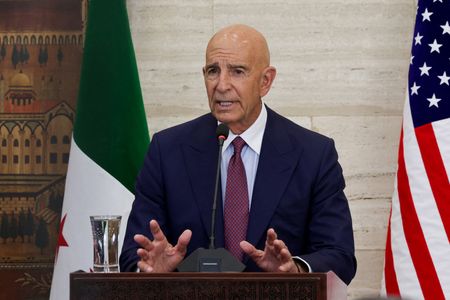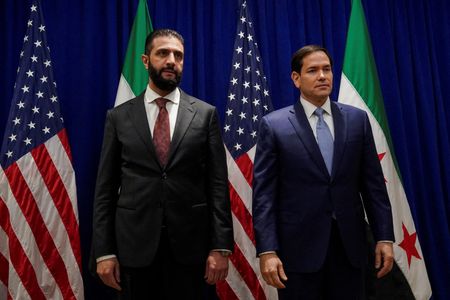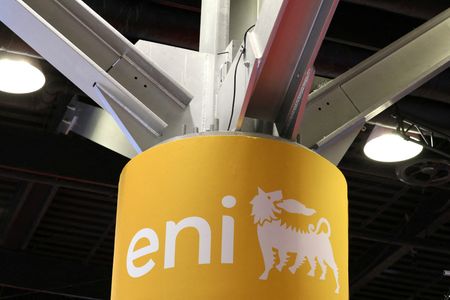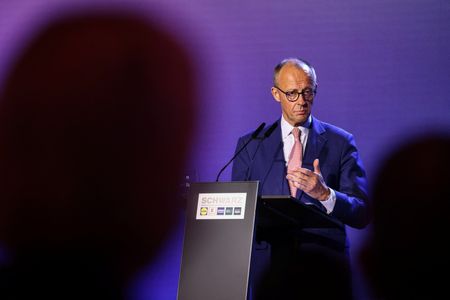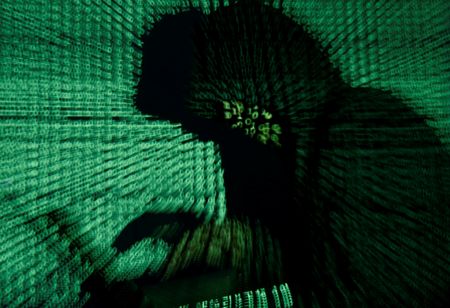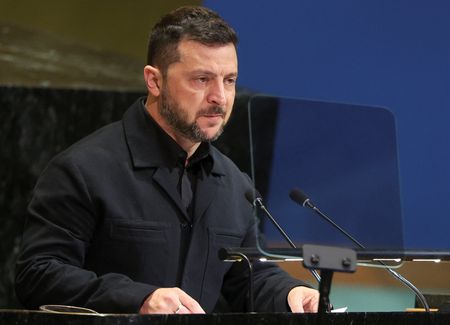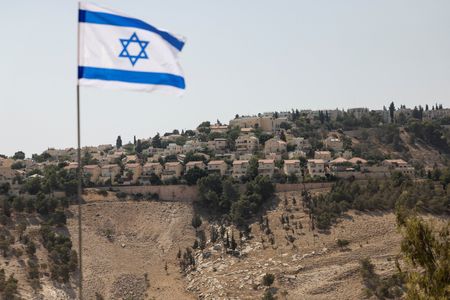By Maya Gebeily
BEIRUT (Reuters) -Efforts to reach a security pact between Syria and Israel have hit a last-minute snag over Israel’s demand that it be allowed to open a “humanitarian corridor” to Syria’s southern province of Sweida, four sources familiar with the talks said.
Syria and Israel had come close in recent weeks to agreeing the broad outlines of a pact after months of U.S.-brokered talks in Baku, Paris and London that accelerated in the lead-up to the United Nations General Assembly in New York this week.
The pact was intended to create a demilitarized zone that would include the province of Sweida, where sectarian violence in July killed hundreds of people from the Druze, an offshoot of Islam.
ISRAEL SAYS IT WILL PROTECT SYRIA’S DRUZE
Israel, which has a 120,000-strong Druze minority whose men serve in the Israeli military, has said it will protect the sect and carried out military strikes in Syria under the banner of defending it.
In earlier talks in Paris, Israel asked to open a land corridor to Sweida for aid, but Syria rejected the request as a breach of its sovereignty.
Israel reintroduced the demand at a late stage in the talks, according to two Israeli officials, a Syrian source and a source in Washington briefed on the talks.
The Syrian source and the source in Washington said the renewed Israeli demand had derailed plans to announce a deal this week. The new sticking point has not been previously reported.
The State Department, the office of Israeli Prime Minister Benjamin Netanyahu and Syria’s foreign ministry did not respond to questions on the contours of the deal or the sticking points.
NO TALKS SINCE LAST WEEK
U.S. envoy Tom Barrack, who has been brokering the talks between Syria and Israel, said on Tuesday the longtime foes were close to striking a “de-escalation agreement” in which Israel would stop its attacks and Syria would agree not to move any machinery or heavy equipment near the border with Israel.
He said it would serve as the first step towards the security deal that the two countries have been negotiating. One diplomat familiar with the matter said it appeared that the U.S. was “scaling down from a security deal to a de-escalation deal.”
Speaking shortly before Barrack at an event in New York, Syrian President Ahmed al-Sharaa, a former al Qaeda leader who led rebel forces that seized Damascus last year, expressed concern that Israel may be stalling the talks.
“We are scared of Israel. We are worried about Israel. It’s not the other way around,” he said.
A Syrian official told Reuters that conversations before the U.N. General Assembly began were “positive,” but there had been no further conversations with Israeli officials this week.
Addressing the U.N. General Assembly on Friday, Netanyahu said he believed an agreement could be reached with Syria that would respect its sovereignty and protect both Israel and the security of minorities in the region.
His office said on Wednesday that concluding ongoing negotiations was “contingent on ensuring the interests of Israel, which include, inter alia, the demilitarization of south-western Syria and preserving the safety and security of the Druze in Syria.”
Syria and Israel have been foes since Israel’s founding in 1948. A disengagement agreement in 1974 created a narrow demilitarized zone monitored by the United Nations.
But since rebels toppled Syria’s then-leader Bashar al-Assad last December 8, Israel has carried out unprecedented strikes on Syria’s military assets across the country and sent troops into the country’s south.
Israel has expressed open hostility towards Sharaa, citing his former links to al Qaeda, and has lobbied the United States to keep Syria weak and decentralized.
In months of talks, Syria had been advocating for a return to the 1974 disengagement agreement. In mid-September, Sharaa described the deal to journalists as a “necessity.” He said then that Israel would need to respect Syria’s airspace and territorial unity but raised the possibility of Israeli breaches.
“We could reach a deal at any moment, but then another problem arises which is: will Israel commit to and implement it? We will see this in the next phase,” he said.
(Reporting by Maya Gebeily; Additional reporting by Maayan Lubell and Alexander Cornwell in Jerusalem, Suleiman al-Khalidi in Amman, Editing by Timothy Heritage)

